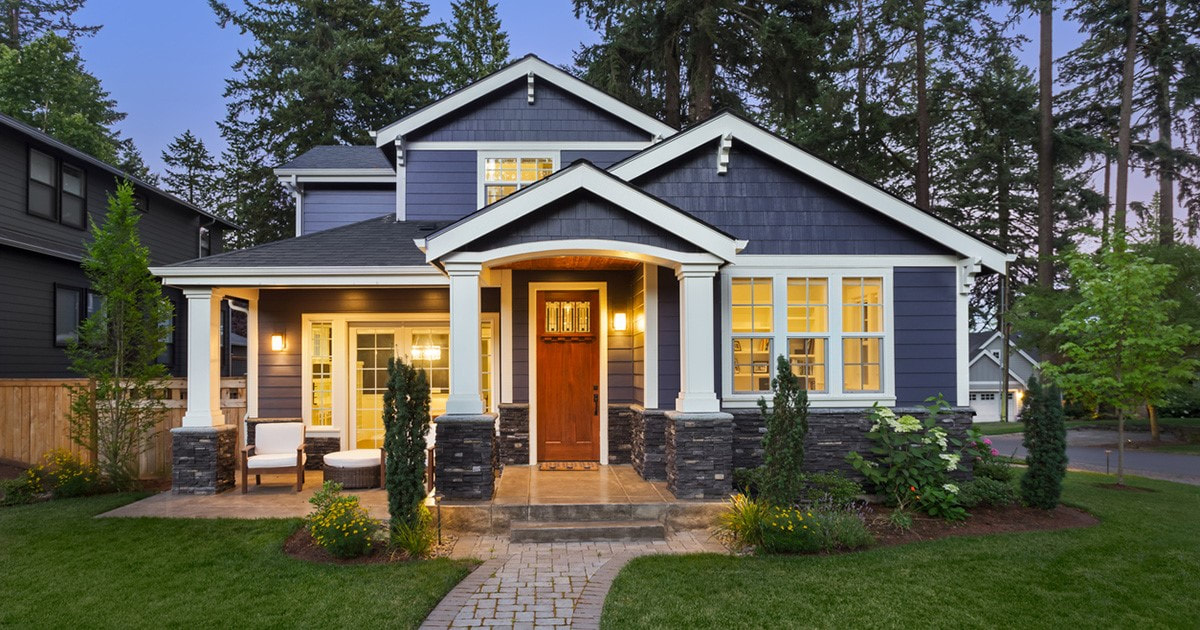Why have a Mortgage during Retirement?3/16/2020 You don't have to watch TV for long before Tom Selleck, Henry Winkler or Robert Wagner will tell you why seniors should consider a reverse mortgage. However, there are a seniors who are resisting the conventional wisdom of having their home paid for and opting for a mortgage with payments on their home.
In some cases, seniors will downsize into a smaller home and have a large amount of equity to pay cash for the new home. In other situations, they may have their home paid for and decide to do a cash-out refinance which will require making payments. The logic behind either of these examples could be motivated by the fact that since mortgage rates are so low currently, the owners can reinvest the money at a higher yield and make money on their equity. This will give them more money for their retirement income. A common question that is asked by owners considering such a strategy is whether they'll be able to qualify for the new mortgage since they may no longer be employed. The Equal Credit Opportunity Act prohibits discrimination against borrowers based on age. All borrowers, whether they are working or not, need to show that they have good credit, reasonable debt and enough stable income to repay the mortgage. Lenders cannot base their decision on loan term based on an applicant's life expectancy, so a 30-year loan is possible regardless of the borrower's age. Fannie Mae, one of the largest purchaser of mortgages on the secondary market, is concerned on income that is stable, predictable and likely to continue. Retirees' income can come from Social Security, pensions, or distributions from retirement accounts like IRAs, 401(k)s, Keogh or other plans. Lenders will analyze these sources to estimate how long it will last. Other investments can be considered like stocks, bonds, mutual funds and annuities. Based on the type and the volatility of the investment, lenders may be restricted from considering 100% of the income. Getting the facts as it pertains to you as an individual is important to be able to know if you are eligible and how much you can borrow. A trusted mortgage professional who understands this type of borrower is very important to help you determine the right mortgage vehicle and provide information to decide if this option is right for you. Call me at if you would like a recommendation.
0 Comments
Take the Standard Deduction & the Home1/21/2020 Now that the standard deduction is increased to $12,200 for single taxpayers and $24,400 for married ones, many homeowners are better off with the standard deduction than itemizing their deductions to write off their mortgage interest and property taxes. There was some speculation that without the tax advantages, homeownership is not the investment it once was.
By looking at the other benefits, you can see that homeownership is still one of the best investments people can make. A $275,000 home financed with a 4.5%, 30-year FHA loan would have an approximate total payment of $2,075. The difference in the value of the home and the amount owed on the mortgage is called equity. Two things cause equity to increase: the home appreciating in value and the principal loan balance being reduced with each payment made on an amortizing loan. In this example, if the home were appreciating at 2% annually, the value would increase by $5,500 the first year which would be $458.33 per month. At the same time, with each payment made, an increasing amount would reduce the unpaid balance which would average $363.00 a month in the first year. The homeowner's equity would increase over $800 a month. Instead of paying rent, the homeowner is building equity in their home. It becomes a forced savings and lowers their net cost of housing. In seven years, the homeowner in this example would have $80,901 in equity instead of seven years of rent receipts. This example doesn't consider tax advantages at all. If the homeowner would benefit from itemizing their deductions, it would lower their cost of housing even more. The IRS recommends each year to compare the standard and itemized deductions to see which would benefit you more. Items such as substantial charitable donations, mortgage interest, property taxes and large out-of-pocket medical expenses could increase the likelihood of itemizing deductions. You can see the benefits using your own numbers without tax advantages by using the Rent vs. Own. Looking to buy your first home? Already own a home? Call Jenni today to see what advantages homeownership can bring you. An Investment Perspective on a Home12/10/2019 Looking for an investment that will turn $10,000 into $80,000 in seven years? Sound too good to be true? What if I told you that you could live in it every day during that seven years? Would that sound even better?
A $300,000 home purchased today on an FHA loan would have a $10,500 down payment. If it appreciated at 2% annually, which is less than the U.S. average, the future value of the home would be $344,606 in seven years. The unpaid balance on the loan would be $256,350 based on normal amortization which would make the equity in the home $88,256. The annual compound rate of return on the down payment would be 35%. This number sounds so large, that you might start doubting the credibility of this example. Looking at some alternative investments, a ten-year Treasury note is currently paying 1.73%. You can earn 2.1% on a ten-year certificate of deposit. If you could handle the volatility of the stock market and pick the right stock, you might earn 7-10%. There really is no alternative investment that can earn the return that an owner-occupied home can offer while giving you the ability to live and enjoy the home during the holding period. Even if you could find an investment that paid a good return, when you realize the gain, you'll be required to pay income tax, either at long-term capital gains rates or ordinary income. However, a person who has lived in a home for at least two of the last five years can exclude up to $250,000 of gain from their income if they are single and up to $500,000 of gain if the owners are married, filing jointly. A home can certainly be a place of your own to feel safe and secure, to raise your family, share with friends and build memories. A home could be considered an emotional investment and one that pays big dividends. A home is also a financial investment not just for the reasons mentioned above but also because the equity can be accessed by doing a cash-out refinance or a home equity line of credit. See what your investment might look like by using the Rent vs. Own and giving us a call at . Title Insurance11/25/2019 Most people who have car, home and health insurance have probably made claims and wouldn't consider being without it. However, it might be difficult to find a homeowner who has made a claim on their title insurance which could lead a person to think that it may not be necessary.
Title insurance covers the largest investment most people have and if there was a loss, it could be devastating. Title insurance indemnifies the policy holder from financial loss sustained from defects in the title to the property. The policy holder is determined by their interest in the property. An owner's title policy protects the owner of the property from title issues that may arise other than the mortgages that are being placed on the property at the time of purchase. The title of the property goes back in time to check that clear title (no unsatisfied liens or levies and poses no question to legal ownership) was passed from owner to owner up to the current seller. A mortgagee's or lender's policy protects the lender by guaranteeing they have an enforceable lien on the property and legal claims from parties asserting they have a claim against the property. Lender's generally require the borrower to provide this coverage. The title search is an examination to determine and confirm legal ownership and if there are clouds on the title so the seller can pass a clear title. A cloud is defined as any document, claim, unreleased lien or encumbrance that might invalidate or impair the title to real property. If a person passes title to a buyer that has unsatisfied liens on the property, the new buyer could become responsible for the money owed and it could affect their ability to sell the property in the future. Unlike most insurance that has a specific term and periodic premiums, title insurance covers the insured for a single premium. An owner's policy lasts for as long as they or their heirs have an interest in the property. It guarantees the title up to the date and time that the property was deeded to you and recorded in the public records. The majority of homes purchased in America have title policies insuring the new owner. You could live in the home for five, ten or twenty years without an incident. Then, when you're ready to sell the home, a title claim could happen. The title policy would still protect you at that point. It is a peace of mind coverage that is part of the investment in your home. 7 Reasons to Buy a Home11/18/2019 Some people don't need a reason to buy a home, they just want it. That can be enough justification by itself. Other people need some solid logic before they're ready to make the commitment. The following reasons might help you to make a decision.
A bonus reason to buy a home now are the low mortgage rates available. The lowest rate recorded by Freddie Mac is 3.35% in December 2012. Today's rates are 3.75% on a 30-year fixed rate mortgage and 3.21% on a 15-year fixed rate mortgage. So, they are certainly very close to all-time lows. The highest rate on a 30-year fixed rate mortgage was 18.45% in October 1981. When you put today's rates in perspective, they are an incredible bargain. Many industry experts expect that they will not remain as low as they are now. Locking in a low rate can keep your housing costs low. A $275,000 mortgage at 3.75% for 30 years has a principal and interest payment of $1,273.57. If the rate goes up by 1%, the payment would increase to $1,434.53 or $160.96 per month for the 30-year term. Check the Rent vs. Own to see how the numbers look in your situation. Buy Your Retirement Home Now11/4/2019 Maybe you're not ready to move into it but that doesn't mean that you shouldn't take advantage of the present opportunities to acquire the home you want to live in during retirement. The combination of the low mortgage rates, high rental rates, positive cash flows and tax advantages can help you get it paid for by the time you're ready to move into it.
Your tenant could literally buy your retirement home for you. One idea would be to finance it with a 15-year loan that will have a lower rate than a 30-year loan and it will obviously be paid for in half the time. With every monthly rental check from your tenant, you make the payment on the mortgage which includes a portion that reduces debt and builds equity. Even if you don't have the home paid for by the time you retire, your equity will be larger. Consider you sell your current home which could be paid for by then when you are ready to move into this retirement home. Taxpayers can exclude up to $500,000 of tax-free gain for a married couple. That profit could be used to fund your retirement. Even if you don't retire to this home, it could be a placeholder to control the costs of the home you do move into. For example, you could buy a home in a destination location now, rent it out and build equity in it until you're ready to use it as your principal residence. That home would have kept pace with other homes in the area so that you would not be priced out of the market you want to retire to. With home prices and mortgage rates certain to rise, this may be one of the best decisions you can make. We want to be your personal source of real estate information and we're committed to helping from purchase to sale and all the years in between. Contact us if you'd like to talk about the idea or if you need a recommendation of real estate professional in another city. 35% of respondents, in a recent annual Gallup poll that dates back to 2002, identified real estate as the best long-term investment option compared to 27% who identified stocks.
The top choices included real estate, stocks, savings accounts and gold. Even with the remarkable prices of the different U.S. stock indices recorded in 2019 through April and May, homes have the highest confidence in the minds of the respondents. This seems to be based on the stability of the housing market and the expectation that home prices will continue to rise. Homeowners build equity from both appreciation as well as reducing principal with each payment made. These same factors exist for investors of rental homes in predominantly owner-occupied neighborhoods. Real estate has another dynamic working to produce favorable investment results due to leverage. Leverage occurs when borrowed funds are used to control an asset. When the borrowed funds are at a lower rate than the overall investment results, positive leverage occurs which can increase the yield from an all cash investment. Gold and savings accounts must be funded with cash. The maximum borrowed funds allowed for stocks is 50% and generally, at a rate higher than typical mortgage rates. Homes are a particularly attractive investment because you can enjoy them personally by living in them. The interest and property taxes are deductible and gains on the profit are excluded up $250,000 for single taxpayers and $500,000 for married taxpayers filing jointly. Many people consider an investment in a home for a rental property an IDEAL investment: Income, Depreciation, Equity Build-up & Leverage. If you have questions or are curious about the process, contact me at [email protected] or (808) 345-6192. Invest in Equity Build-Up9/23/2019 Equity build-up could be one of the biggest advantages to buying a home. There are two distinct dynamics that take place to make this happen: each house payment applies an amount to reduce the mortgage owed and appreciation causes the value of the home to go up.
It is easy to make a projection based on the type of mortgage you get and your estimation of appreciation over the time you expect to own the home. Even conservative estimates can produce impressive results. Let's look at an example of a home with a $270,000 mortgage at 4.5% for 30 years and a total payment of $2,047.55 payment including principal, interest, taxes and insurance. The average monthly principal reduction for the first year is $362.98. If you assume a 3% appreciation on the $300,000 home, the average monthly appreciation is $750 a month. The total payment of $2,047.55 less $1,112.98 for principal reduction and appreciation makes the net monthly cost of housing, excluding tax benefits, $934.57. If this hypothetical person was paying $2,500 in rent, it would cost them $1,565.43 more to rent than to own. In the first year, it would cost them over $18,000 more to rent. Together, the items in this example contribute over $1,100 to the equity in the home . This is one of the reasons a home is considered forced savings. By making your house payments and enjoying increases in value, the equity grows and the net cost of housing decreases by the same amount. In this same example, the $30,000 down payment grows to $133,991 in equity in seven years. While this is equity build-up, the extraordinary growth is attributed to leverage. Leverage is an investment principle involving the use of borrowed funds to control an asset. To see what your net cost of housing and the effect of leverage will have on a home in your price range, see the Rent vs. Own. If you have questions or need assistance, contact me at (808) 345-6192. Money You Saved for a Down Payment9/9/2019 Occasionally, buyers who can qualify to purchase a home decide to "take a break" and wait to purchase a home. When the focus of buying a home is relaxed, other uses for the money that was going to be used for the home are considered. Maybe they think how much fun it would be to have a Sea Doo or a motorcycle or a new car. It is amazing how many people would like to buy a home but either don't have the down payment, the income or the good credit to make it possible. Instead of spending the money, consider investing the money for two years until the time is right to buy a home. Let's look at putting the money in a certificate of deposit that earns 2% or in the stock market that could average a 5% return. Assume you were purchasing a $295,000 home on a FHA loan with 3.5% down payment. The $10,325 would grow to $10,742 in the CD which isn't a big increase but at least it is safe and secure, and it will be available when you're ready. If the same amount were invested in a safe stock or mutual fund that earned 5%, it would grow to $11,383 in the same two-year period. It earns more but there is more risk involved. Alternatively, if you invest the same amount in purchasing a home that appreciates at 3% a year, the equity would be $38,871 two years from now. The dramatic increase is due to leverage, being able to control a large asset with a small amount of cash. The appreciation is based on the purchase price not the down payment.
Another factor is that there is principal reduction with each payment that is made. Make your own projections with Your Best Investment. Jennifer R. Rhodes (R), BIC RB-22809 (808) 345-6192 [email protected] AuthorRead helpful articles and real estate resources shared on behalf Realtor® Broker, BIC Jennifer R. Rhodes of Premier Island Properties LLC Archives
June 2020
Categories
All
|
|
RB-22237
|
|










 RSS Feed
RSS Feed
